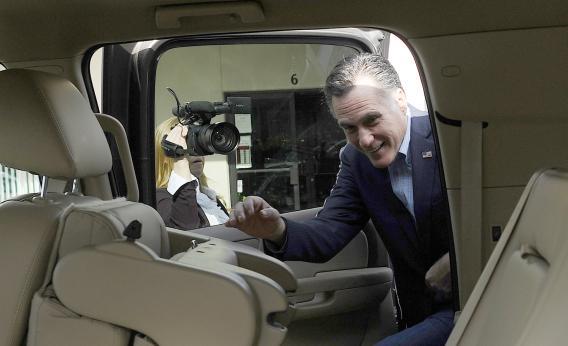Mitt Romney may be unsure which hat to wear when it comes to General Motors. In a Detroit News article this week, the Republican presidential candidate exhorted President Barack Obama’s administration to offload Uncle Sam’s holding in the automaker, which reported fourth-quarter earnings on Thursday. That may be Political Romney’s take, but selling now would leave taxpayers with a hefty loss. That’s a hit Private Equity Romney would surely avoid.
Romney is right that governments should try not to hold long-term positions in private companies. So if the U.S. government were to sell its 32 percent of the Detroit automaker immediately, that would superficially satisfy Romney’s belief in free-market capitalism.
But at Wednesday’s closing share price, doing so would leave taxpayers shouldering a $14 billion loss on their GM investment - almost a third of what Presidents George W. Bush and Barack Obama poured in to keep the company on the road. Not only would crystallizing that loss offend Romney with his private equity background. It’s also a sure bet that Romney the presidential candidate would have pounced on it as evidence of Obama’s fiscal irresponsibility.
Of course, it’s not quite the same as a private equity investment - price shouldn’t trump everything else. The U.S. government invested in GM, Chrysler and hundreds of banks to keep them afloat, not to make a profit. Even so, it isn’t hard for the government to explain why it’s OK that it still holds a significant stake 15 months after GM went public.
Executive pay aside, officials have not interfered with the automaker’s business; the fact that its investment has largely been a non-issue for months speaks to that. And the Treasury has proved adept at getting out of other bailout positions relatively quickly and at a profit - just the kind of responsible approach Romney advocates. That should give non-partisans comfort that the GM stake is receiving the same treatment.
There’s also a reasonable case that GM’s market value will rise over the next year or more as it continues working on its turnaround, especially in its loss-making European operations. If Romney finds himself in the Oval Office next year and he’s able to sell the GM stake at a profit, both his political and private equity personas will find it hard to resist taking the credit.
Read more at Reuters Breakingviews.
